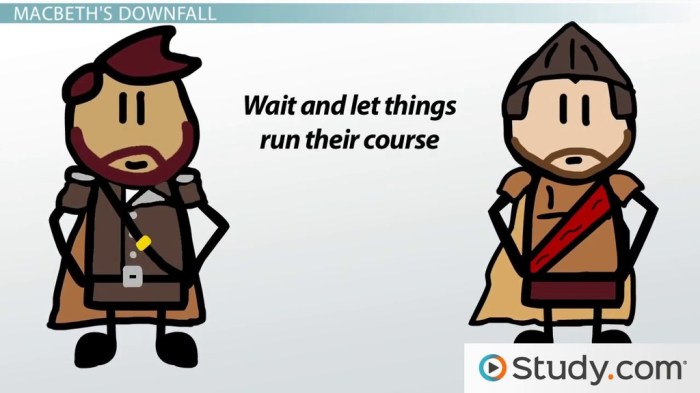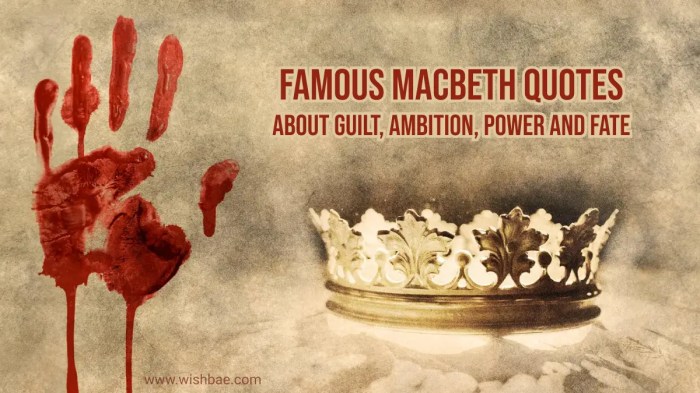Fate and free will macbeth – As fate and free will take center stage in Macbeth, this opening passage beckons readers into a world crafted with keen insight and meticulous detail, ensuring a reading experience that is both captivating and distinctly original.
Fate, an enigmatic force that weaves the threads of destiny, plays a pivotal role in Macbeth’s tragic journey. Yet, amidst the machinations of fate, the question of free will lingers, challenging our understanding of human agency and responsibility.
The Role of Fate in Macbeth
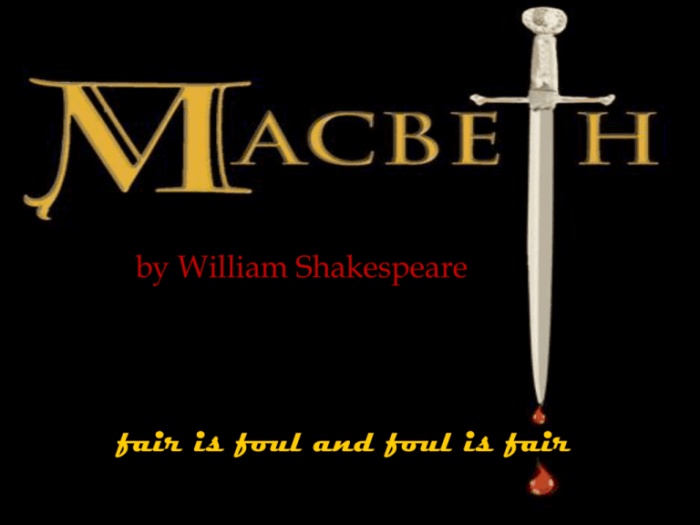
Fate plays a crucial role in Macbeth, shaping the protagonist’s actions and ultimately leading to his tragic downfall. The play presents fate as an external force that guides and controls the characters’ lives, often beyond their own understanding or control.
From the beginning, Macbeth is haunted by the prophecies of the witches. These prophecies, particularly the prediction that he will become king, set him on a path of ambition and violence. Despite his initial reluctance, Macbeth is unable to resist the allure of fate and succumbs to the temptation of power.
The Witches’ Prophecies
The witches’ prophecies serve as a catalyst for Macbeth’s downfall. They plant the seeds of ambition in his mind, leading him to believe that he is destined for greatness. However, the prophecies are also ambiguous and open to interpretation, allowing Macbeth to shape them to fit his own desires.
The witches’ prophecies are not simply external forces but also reflect Macbeth’s own inner turmoil. They represent his subconscious desires for power and status, which he has previously suppressed. The prophecies give him permission to act on these desires, even though he knows they will ultimately lead to his ruin.
The Nature of Free Will in Macbeth
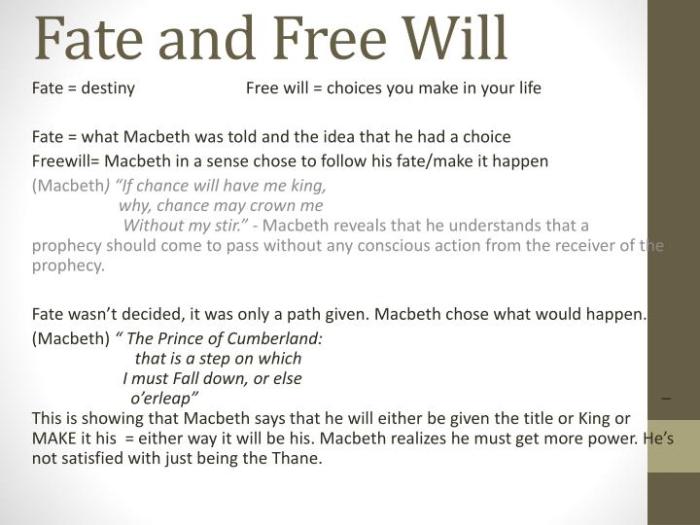
Free will is the ability to make choices independently, without external influences or constraints. In Macbeth, the concept of free will is complex and multifaceted. Macbeth’s actions are often driven by his own desires and ambitions, but he is also influenced by supernatural forces, such as the witches’ prophecies and the ghost of Banquo.
To what extent does Macbeth exercise free will in making his choices? Some critics argue that Macbeth is a victim of fate, that his actions are predetermined by the witches’ prophecies. Others argue that Macbeth is a free agent, that he makes his own choices and is responsible for his actions.
In Shakespeare’s Macbeth, the interplay of fate and free will is a central theme. Macbeth’s actions are influenced by both external forces, such as the witches’ prophecies, and his own choices. For students studying this play, the CPM Chapter 8 Answer Key provides valuable insights into the characters’ motivations and the complexities of the plot.
By examining the answer key, students can deepen their understanding of Macbeth’s struggle between destiny and agency.
Macbeth’s Own Actions Contribute to His Downfall, Fate and free will macbeth
Regardless of whether or not Macbeth is a victim of fate, it is clear that his own actions contribute to his downfall. He chooses to murder Duncan, and this choice leads to a series of other tragedies. He chooses to listen to the witches’ prophecies, and this choice leads him to believe that he is invincible.
He chooses to ignore the warnings of his wife, and this choice leads to his downfall.
Macbeth’s choices are not always rational or logical, but they are his own. He is a complex and flawed character, and his actions are a reflection of his own nature.
The Interplay of Fate and Free Will: Fate And Free Will Macbeth
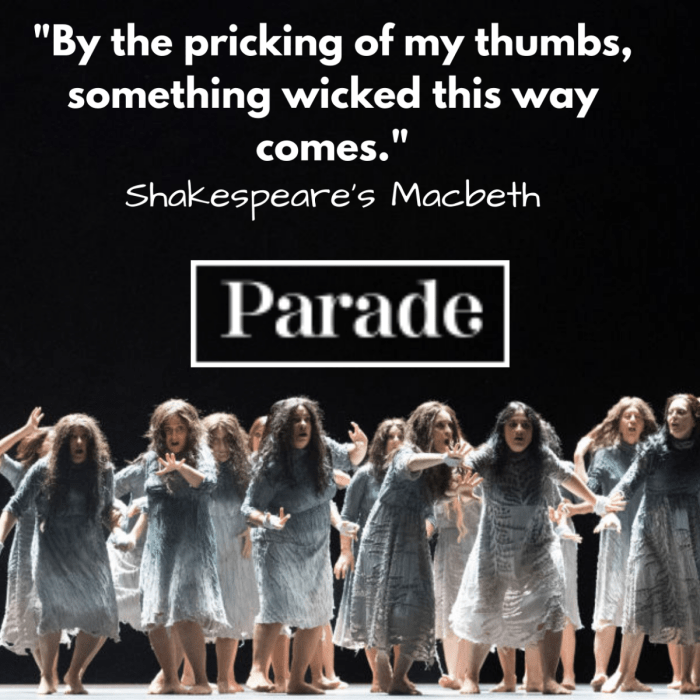
Fate and free will are two intertwined concepts that play a crucial role in the tragedy of Macbeth. Macbeth’s journey is a complex interplay between the prophecies of the witches and his own choices. While the witches’ prophecies set the stage for Macbeth’s downfall, it is ultimately his own actions that seal his fate.
Macbeth’s Choices and the Witches’ Prophecies
Macbeth’s initial encounters with the witches plant the seeds of ambition in his mind. The witches’ prophecies that he will become Thane of Cawdor and King of Scotland ignite his desire for power. However, it is Macbeth’s own ambition and ruthless nature that drive him to commit the heinous crimes that lead to his downfall.
For example, after learning that he has been named Thane of Cawdor, Macbeth says, “If chance will have me king, why, chance may crown me, / Without my stir.” This suggests that Macbeth is willing to let fate take its course and that he does not believe his own actions are necessary to achieve his goals.
However, later in the play, Macbeth becomes more proactive in pursuing his ambitions. He murders Duncan, the king, and Banquo, his friend, in order to secure his position on the throne. These actions demonstrate that Macbeth is not merely a pawn of fate but that he has the free will to make choices that shape his destiny.
The Extent of Macbeth’s Responsibility
The extent to which Macbeth’s actions are predetermined or self-determined is a matter of debate. Some argue that Macbeth is a victim of fate, that the witches’ prophecies set him on an inevitable path to destruction. Others argue that Macbeth is responsible for his own actions, that he had the free will to resist the temptations of power and violence.
Ultimately, the interplay of fate and free will in Macbeth is a complex and unresolved question. The play suggests that both fate and free will play a role in shaping human destiny, but it does not provide a clear answer as to which is more powerful.
Thematic Implications of Fate and Free Will
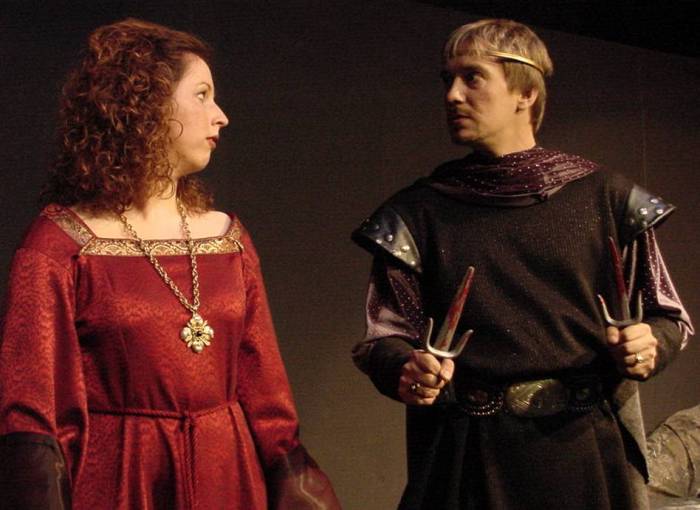
The interplay of fate and free will in Macbethhas profound thematic implications, exploring the nature of human responsibility, accountability, and the broader cultural and philosophical debates of the time.
Human Responsibility and Accountability
The play raises questions about the extent to which individuals are responsible for their actions. Macbeth’s initial hesitations and moral struggles suggest a belief in free will, but his gradual descent into tyranny and violence shows how external forces can influence choices.
Cultural and Philosophical Debates
The play’s treatment of fate and free will reflects the prevailing ideas of the Elizabethan era. The belief in divine providence and predestination coexisted with a growing emphasis on human agency and individual responsibility. Macbethexplores this tension, leaving audiences to grapple with the complex relationship between these two concepts.
FAQ Insights
How does fate influence Macbeth’s actions?
Fate, in the form of the witches’ prophecies, sets Macbeth on a path of ambition and violence. It tempts him with the promise of power and drives him to commit heinous acts.
To what extent does Macbeth exercise free will?
Despite the influence of fate, Macbeth retains the power of choice. He is not a passive pawn but an active participant in his own downfall. His ambition and moral weakness ultimately lead him to embrace the path of evil.
How do fate and free will interact in Macbeth?
Fate and free will are intertwined in Macbeth. The witches’ prophecies create a sense of inevitability, but Macbeth’s own choices and actions shape his destiny. He is both a victim of circumstance and an agent of his own destruction.
